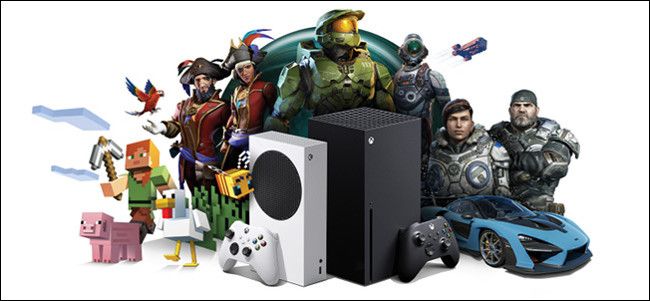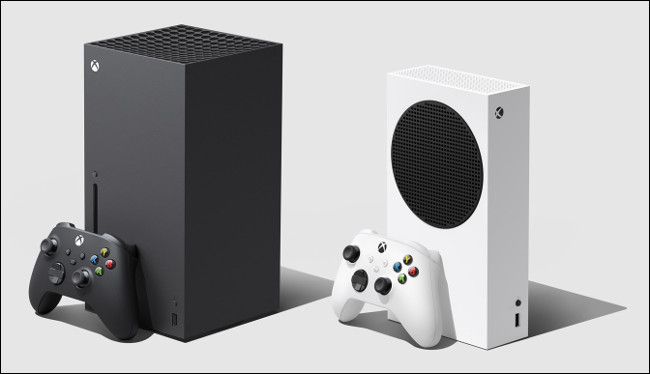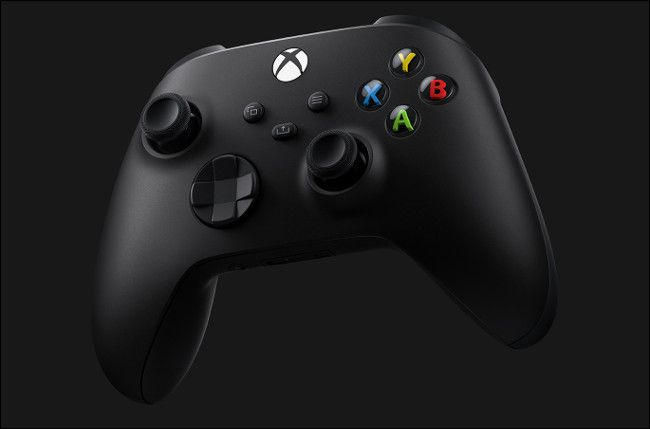Quick Links
Microsoft will launch two new consoles Nov. 10, 2020. Should you get the chunky Xbox Series X, or the much smaller (and cheaper) Series S? Let's take a look at the differences, and which is the better buy.
Series X or S: What's the Difference?
First, we need to take a moment to address Microsoft's confusing naming conventions. The new, next-generation Xbox consoles are the Series S and Series X. These are not to be confused with the Xbox One X or One S, both of which are last-generation machines.
With that out of the way, the following are the main differences between the Series X and Series S:
- Price
- Target resolution
- Total storage
- A disc drive
The two machines also look quite different. The Series X is tall and all-black, while the Series S is 60 percent smaller, and white with a black fan vent.
Both machines will launch on November 10, with preorders starting September 22. Both machines are available to purchase outright, or as part of Microsoft's All Access program, which operates as a mobile contract. You pay a monthly fee for the console over two years, at which point it's yours.
The Series X will launch for $499 or $34.99 per month via All Access. The Series S will cost $299, or $24.99 per month on All Access. There are no up-front costs if you want to pay monthly.
The second major difference is the target resolution. The Xbox Series X is a native 4K gaming machine. This means it will render games at (or as close as possible) 2160p. To benefit from this, you'll need a 4K (or Ultra HD) TV or monitor.
The Series S targets 1440p, which is half the resolution of 4K. For gamers who still have a 1080p (HD) TV or monitor, and don't plan to upgrade to 4K any time soon, this is ideal. You'll still be able to play 4K media and upscale lower-resolution content, but the device won't render games any higher than 1440p.
While the Series X comes with 1 TB of storage, the Series S only has half that at 500 GB. Both machines use the same high-speed solid-state drive required for next-generation performance. They're also both upgradable in 1 TB increments via Microsoft's additional proprietary storage solution.
Finally, the Xbox Series S is an all-digital console. This means it doesn't have a disc drive---you'll have to download all games from the internet (or stream them, if you prefer). There are some things to consider before going all-digital, like whether you're okay with missing out on secondhand games or UHD Blu-ray playback.
Is the Series S a Good Buy?
Despite its major differences in price and target resolution, the Xbox Series S still aims for the same lofty performance targets as its more capable sibling. Chief among these is a new 60-frames-per-second baseline for smoother gameplay, with some games tipped to hit 120 frames per second.
To benefit from these, though, you'll need a high-refresh-rate monitor of 120 hz or better. Microsoft has announced a handful of games (including the upcoming multiplayer portion of Halo Infinite) that will target 120 frames. During the Xbox Series S showcase, the console was shown running Gears of War 5 (released earlier this year) at 120 frames per second.
At this stage, it remains to be seen how many games will actually hit these targets, and whether the Series S can truly keep up with the more powerful Series X. Both are considered "next-gen" by Microsoft, so they'll share the same library of games moving forward.
It's worth mentioning that the Series X has roughly three times the GPU power of the Series S, although this measurement (in teraflops) rarely translates to raw performance. The Series S is still rocking the same eight-core AMD Zen 2 processor as the Series X, although it's clocked slightly lower on the less powerful model.
If you're considering the Series S, you might also want to think about your upgrade plans over the next few years. Chiefly, are you going to be buying a 4K TV soon? If so, the Series S might really show its age when you hook it up to a higher-resolution display. However, a 1440p output on a 4K display will still look better than the 1080p on the PS4 and Xbox One.
Another thing to think about is the Series S won't run the Xbox One X-enhanced versions of existing games. And this library has been growing steadily since 2017, when Microsoft first released the One X.
Instead, Microsoft has announced Series S-enhanced versions. Coupled with the lack of a disc drive, the Xbox Series S might not be best for those who place a high value on backward compatibility.
As with any all-digital console, there are some additional things to consider before ditching a disc drive, like not having access to physical games or the secondhand market. You also lose the option of using your console as a Blu-ray player.
Strapped for Cash? Xbox All Access Might Help
Microsoft has announced that both consoles will be available via Xbox All Access. For a monthly fee, you get a console and Game Pass Ultimate, which provides access to over 100 games, including first-party releases on release day. At the end of the two-year contract, the console is yours, and you can also extend your Game Pass if you want.
If you want a Series X, but only have enough cash for the Series S, All Access might sweeten the deal. At $34.99, a Series X is only $10 more per month.
Further, if you crunch the numbers, All Access is a surprisingly good deal. If you add the cost of an Xbox Series X ($499) and 24 months of Game Pass Ultimate ($359.76), your total out-of-pocket cost is $858.76.
If you're new to Game Pass, though, you get your first month for $1, which reduces your total cost to $844.77. If you get the Series S instead of the Series X, you can knock off another $200.
All Access costs $34.99 per month for two years. So, an Xbox Series X with two years of Game Pass Ultimate would cost $839.76 total. For a Series S plan, the total cost would be $599.76.
An All Access plan will save you $19 on a Series X, or $59 on a Series S, compared to the full price. Keep in mind, if you're not interested in Game Pass Ultimate for two years, you're still better off buying outright.
Microsoft has also announced that Game Pass now includes EA Access, which further compounds the value proposition of both consoles. You'll get first-party Microsoft titles, new releases published by EA, and a smattering of third-party titles from day one.
You'll also save more money with the Series X if you buy secondhand games or physical copies from retailers when they're on sale. All-digital gamers will always be stuck with Microsoft's digital pricing and Game Pass availability.
Sony and Microsoft Go Head-to-Head
The launch of a new generation of consoles is always exciting, but it can also be underwhelming at first. Launch titles barely scratch the surface of what the hardware is capable of, so we'll likely see a lot of cross-generational releases until the devices mature a bit.



